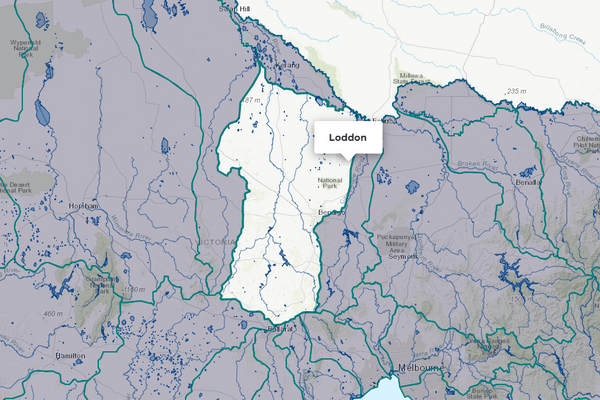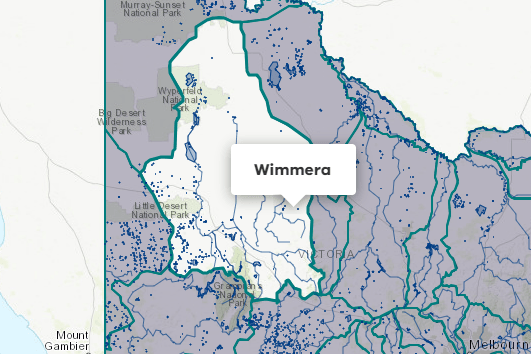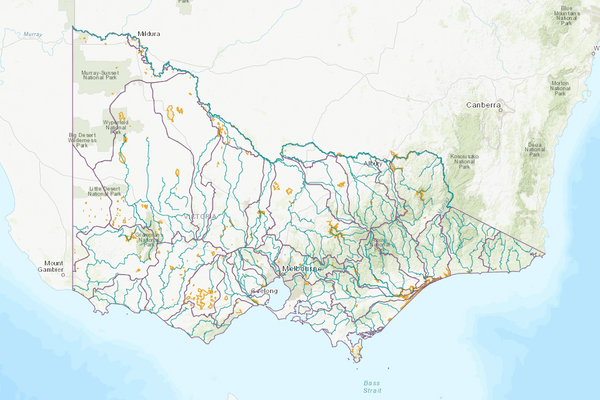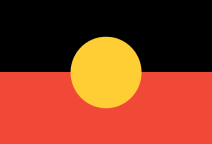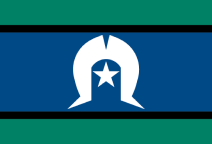About the area
The Avoca basin includes the Avoca River, small tributaries (such as Strathfillan Creek and Cherry Tree Creek) and minor watercourses that drain internally (such as Tyrrell Creek, which terminates in Lake Tyrrell). The Avoca River flows into the Kerang Lakes at Lake Bael Bael.
For the purposes of these Accounts, the Avoca basin excludes Swan Hill and the Torrumbarry Irrigation Area, which are supplied from the Murray River.
The narrow section in the south of the basin consists of steep hills while the wider northern end consists of undulating alluvial plains. Average annual rainfall decreases northwards from around 600 mm near Avoca to 200-300 mm at Lake Tyrell in the far north.
In the basin’s north, the land is used for grazing and wheat cropping apart from some small areas of forest south of St Arnaud. There are several small swamps and marshes upstream of Kerang.
More information on water management and accounting is detailed in Water explained.
2023-24 overview
Available water
Catchment inflow was lower than the previous year.
Licensed diversion restrictions
There were fewer restrictions on licensed diversions than the previous year.
Water use
Less water was used than the previous year.
When compared to the previous year, in 2023-24:
- less rainfall was received and catchment inflows were lower
- there were fewer restrictions on licensed diversions from streams
- less water was diverted from the basin for consumptive uses.
Climate
Rainfall
In 2023-24, rainfall in the Avoca basin was above the long-term average in the north-east and below average in the far south of the basin. This was lower than the previous year when rainfall was very much above average across the entire basin.
Figure 1 displays the rainfall received in 2023-24 compared to the long-term average (1975-2024).
Figure 1: Rainfall deciles, Avoca basin
Sourced from the Australian Bureau of Meteorology
River basin water balance
This section describes the known and estimated inflows, outflows and change of storage volumes in the basin.
More detail on catchment inflows, diversions and small catchment dams can be found in the sections below the water balance.
In 2023-24, 13,893 ML outflowed to the terminal lakes in the basin (compared to 88,589 ML in the previous year).
Water balance table
The table below shows the total volumes of water available and supplied from water resources in the Avoca basin in 2023-24.
Table 1: Water balance, Avoca basin
Inflows
Catchment inflow
Catchment inflow represents the volume of water flowing into the waterways of a basin. It is calculated as the total outflows and change in storage minus the known inflows. The long-term average inflow presented has been updated from the previous Victorian Water Accounts, as detailed in Water Explained. The updated long-term average inflow has been applied to this year and the previous year’s volume in this report.
Below average inflows of 20,159 ML were received (26% of the long-term average of 78,100 ML), less than the previous year (149% of the long-term average).
Below average inflows received
Catchment inflow was 26% of the long-term average annual volume of 78,100 ML.
Less water received than the previous year
Catchment inflow was lower than the previous year (149% of the long-term average).
Wastewater treatment plants
Water treated at wastewater treatment plants can be used to supplement water available in the basin. Water discharged to waterways from treatment plants is included as an inflow to the water balance.
Information on treatment plants is reported in the water supply local reports for the water corporation responsible for managing the plant.
In this basin, wastewater treatment plants are managed by Central Highlands Water and Grampians Wimmera Mallee Water.
Outflows
Diversions
In 2023-24, 836 ML of water was diverted for consumptive uses: town, domestic and stock, irrigation and commercial supply, less than the 3,457 ML diverted in the previous year. However, most of this difference is due to the 2,567 ML decrease in estimated small catchment dam use.
Small catchment dams
Water harvested, used and lost by small catchment dams (farm dams) is included in the water balance.
Table 2: Small catchment dams, Avoca basin
Entitlements and compliance
Entitlements provide the basis for how water is shared in the basin.
Entitlement volumes
Rights to water in the Avoca basin are shown in Table 3.
Entitlement volumes represent a maximum volume of water that can be taken in a one-year period. The volume available in a particular year is dependent on the rules for allocating water set out in the entitlement and the seasonal conditions in that year, which can vary. The rules for allocating water under an entitlement differ between entitlements and systems. This affects the ability and likelihood of water being taken in a particular year.
Table 3: Annual entitlement volumes at 30 June, Avoca basin
Available water and take under entitlements
Total water available under entitlements represents the volume of water that was available to be taken by entitlement holders in 2023-24. The volume includes seasonal allocations and net trade into the basin.
Water taken
There was 407 ML used in 2023-24, less than the previous year (1,603 ML).
Restrictions on licensed diversions from streams
- There were no restrictions on licensed diversions from the Avoca River in 2023-24.
- During the previous year, licensed diversions from the Avoca River were banned from July to partway through August 2022.
Available water and take table
This table shows the volume of available water and the volume taken under entitlements in 2023-24.
More information on available water and take has been detailed in How we account for surface water.
In 2023-24, less water was taken under entitlements than the previous year.
Table 4: Available water and take under entitlements, Avoca basin
Compliance
Compliance against water entitlements is reported for this basin in 3 areas:
- entitlement issued: that the volume of entitlements issued in a basin does not exceed formal caps, and has not increased without appropriate approvals
- water taken: that the volume of water taken during the year does not exceed the volume considered to be available for consumptive and/or in-stream use during that year
- bulk entitlement provisions: that holders of entitlements do not breach any provisions that are documented in their bulk entitlement orders.
Total entitlement volume
There was no net increase in the total entitlement volume from the previous year.
Total volume diverted
The total volume diverted under entitlements (407 ML) was within the volume available for the year (7,736 ML).
Individual bulk entitlements
No individual bulk entitlement holder took more than the annual volume made available to them.
Exceptions to compliance
Individual bulk entitlement holders complied with all provisions in their entitlements.
Water for the environment
Environmental watering sites
There are no environmental entitlements in the Avoca basin, however, some wetlands in the Avoca basin can receive water from the Wimmera Mallee Pipeline. No other active environmental watering occurs.
However, important sites and environmental values in the Avoca basin that depend on water for the environment include:
- the Avoca River, with red gums and a floodplain system in the lower Avoca and grassy woodland in the upper Avoca
- the lower Avoca grasslands, a unique, largely intact mosaic of floodplain associated with grassland and grassy woodland communities and significant flora and fauna values.
Environmental water reserve
In 2023-24 water for the environment in the Avoca basin comprised:
- water set aside for the environment through the operation of passing flow conditions:
- on consumptive bulk entitlements held by Central Highlands Water
- on licensed diversions
- all other water in the basin not allocated for consumptive uses: this water also provides social, recreational and cultural benefits.
Environmental water use
In 2023-24, a total of 8 ML of environmental water was used in the Avoca basin. This was all diverted off-stream to wetlands under the shared Wimmera and Glenelg Rivers Environmental Entitlement 2010.
The breakdown per basin of the volume delivered to wetlands is based on Victorian Environmental Water Holder’s 2023-24 Seasonal Watering Plan and Reflections reports. The exact breakdown is not measured per basin and so this volume is an estimate. The total volume delivered to wetlands is known (269 ML).
Management responsibilities
Management of water in the Avoca basin is undertaken by various parties
| Authority | Management responsibilities |
|---|---|
| Central Highlands Water |
|
| Goulburn-Murray Water |
|
| Grampians Wimmera Malee Water |
|
| North Central Catchment Management Authority |
|
| Water supply system | 2022-23 (ML) | 2023-24 (ML) |
|---|---|---|
| Amphitheatre | 8 | 10 |
| Avoca | 25 | 19 |

